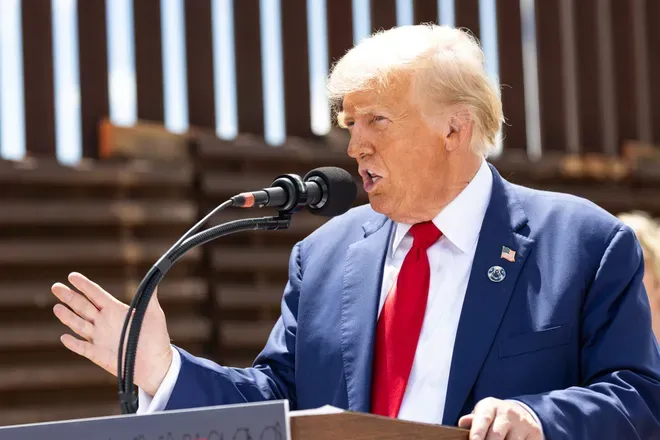The most notable conservative achievement of former President Donald Trump's administration could also be his 2024 campaign's Achilles' heel: the overturning of Roe v. Wade, the landmark Supreme Court decision that had safeguarded abortion rights for 50 years. This development has paved the way for stringent state and federal abortion restrictions, putting Trump in a difficult position.
During the 2024 campaign, Trump has sought to distance himself from his party's more controversial policies while still satisfying anti-abortion supporters. Although he doesn't support a national abortion ban—something his running mate, Sen. JD Vance of Ohio, has previously endorsed—Trump frequently highlights his role in appointing the Supreme Court justices who facilitated the new wave of abortion restrictions by overturning Roe.
This week, the former president’s juggling act with abortion politics finally caught up with him, revealing the difficulties faced by the Republican presidential nominee on this issue.
After months of avoiding a clear stance and initially indicating support for a more permissive approach, Trump announced on Friday his opposition to a Florida ballot measure that would legalize abortion up to the point of fetal viability outside the womb—approximately 24 weeks of pregnancy, the standard under Roe v. Wade before it was overturned.
Referred to as Amendment 4, Florida's ballot measure aims to reverse the state's ban on abortions after approximately six weeks of pregnancy. This ban, enacted last year by Governor Ron DeSantis during his presidential campaign and approved by the Republican-dominated Legislature, is among the strictest abortion laws in the country. Former President Trump has been keen to distance himself from it.
Marjorie Dannenfelser, President of Susan B. Anthony Pro-Life America, promptly responded to Trump's remarks, asserting that his support for Amendment 4 "completely undermines" his previous stance on abortion. Conservatives had already been growing uneasy with Trump's attempts to soften his position on abortion, including his recent claim that "my administration will be great for women and their reproductive rights."
In response to the backlash from his Thursday comments, the Trump campaign issued a statement that evening clarifying that Trump had not yet made a decision on how he would vote on Amendment 4. Dannenfelser later released a follow-up statement revealing that she had spoken with Trump and confirmed that he was still undecided on the Florida ballot measure.
By Friday, Trump had made up his mind. Succumbing to pressure from the right, he told FOX News, "I'll be voting no" on Amendment 4, indicating he would support maintaining his state's ban on abortions after six weeks.
Next, it was the left's turn to react.
"Donald Trump just made his position on abortion very clear: He will vote to uphold an abortion ban so extreme it applies before many women even know they are pregnant," said Vice President Kamala Harris, Trump's Democratic opponent, in response to his Friday remarks.
Republican consultant Alex Conant noted that Trump's struggle to present a consistent stance on abortion undermines one of his key strengths.
"Trump's appeal is that he's authentic," Conant said. "You know what he thinks. That's why his flip-flopping on abortion issues is so surprising."
In April, a Pew Research Center survey revealed that 63% of U.S. adults believe abortion should be legal in all or most cases.
However, in the wake of Roe v. Wade being overturned, Republicans have rapidly moved to impose abortion restrictions at both state and national levels. U.S. Senator Lindsey Graham from South Carolina proposed federal legislation to ban abortion after 15 weeks of pregnancy, while numerous conservative states have enacted even stricter measures.
The Guttmacher Institute, an organization advocating for abortion rights, reports that 14 states have implemented total abortion bans, four states prohibit the procedure after six weeks, and two states impose a 12-week limit.
In response, voters are actively resisting these restrictions.
Ballot initiatives aimed at safeguarding abortion rights, such as the one in Florida, have achieved success in states like Kansas and Michigan since Roe was overturned, causing concern among Republicans.
Jamie Miller, a GOP consultant and former executive director of the Republican Party of Florida, described the Florida ballot measure as a contentious issue. He noted the dilemma between a less restrictive abortion ban, which could be modified easily since it's not part of the state constitution, and a more rigid measure that would be difficult to alter and seen as excessively extreme for Florida.
Miller suggested that former President Donald Trump, like many Floridians, is grappling with the abortion issue.
When asked about Trump’s challenges with abortion policy, Trump campaign spokesperson Karoline Leavitt stated that "President Trump's record is clear," without further details, and criticized Democratic rival Kamala Harris for her "extreme position" on abortion.
The Harris campaign highlighted her previous commitment to restoring the abortion protections that existed under Roe, maintaining that stance.
Trump faces a paradox with abortion: although he has fulfilled the long-standing conservative goal of overturning Roe, he now contends with the fallout of increasingly restrictive state laws that are unpopular with swing voters.
The Alabama Supreme Court recently ruled that embryos created through in vitro fertilization (IVF) should receive the same legal protections as children, which could jeopardize the popular infertility treatment. In response, Trump expressed his support for IVF and proposed this week that insurance companies should be required to cover the expensive procedure. However, his campaign has yet to provide a detailed proposal or any specifics on how this would be implemented.
Trump has sought to navigate the delicate balance between distancing himself from extreme anti-abortion positions while still appealing to his base of strong anti-abortion supporters.
Republican consultant Mike Murphy, who has advised various GOP presidential candidates and is a critic of Trump, commented on X that Trump’s stance on abortion is “actually multiple choice.” Murphy accused Trump of trying to “scam a vote” and called him a “true con man with zero beliefs.”
Navigating such complex issues can be politically risky, as demonstrated by the recent abortion debate in Florida. Faced with the choice of alienating his base or continuing to align with those opposed to the measure, Trump opted to cater to his base.
Opposing Amendment 4 might help maintain the support of Christian conservatives crucial to Trump's coalition, but it also risks closely associating him with what critics argue is a near-total abortion ban.
Anthony Verdugo, Executive Director of the Christian Family Coalition Florida, minimized the notion that abortion could be a decisive factor.
"Assuming that women voters are solely concerned with abortion is both stereotypical and offensive," he said.
Conant suggested that Trump simply needs to maintain a consistent stance on abortion.






Post a Comment